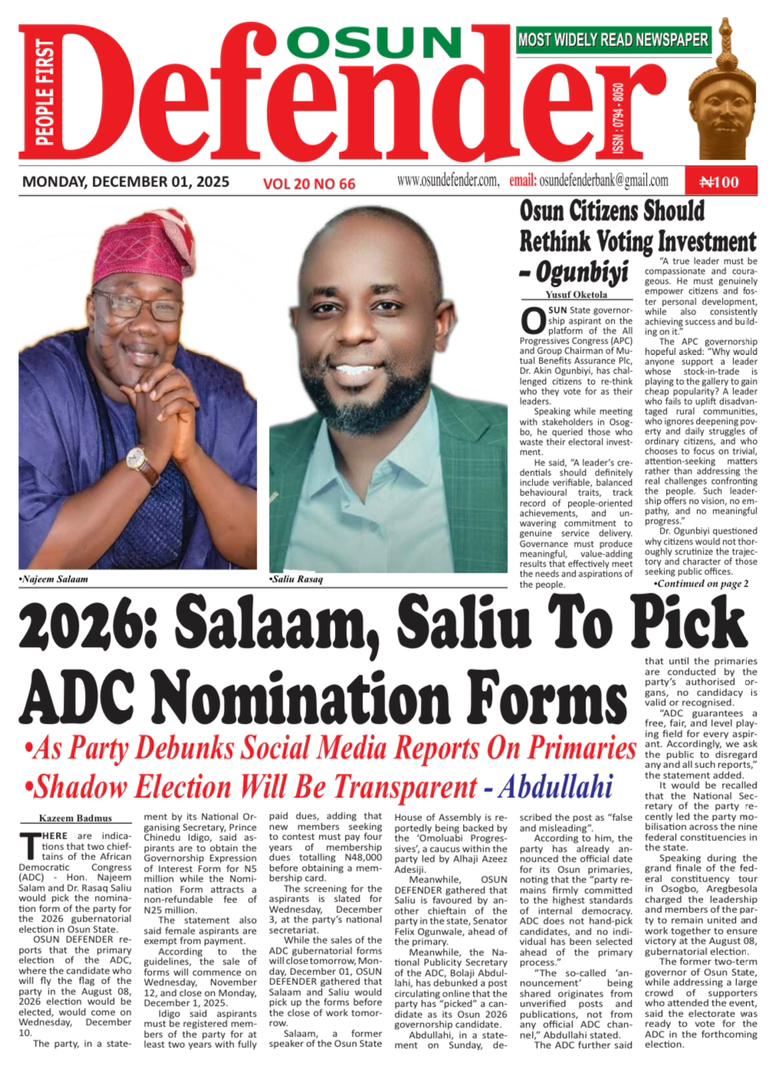By Kazeem Ugbodaga
With his words that the April 2007 Presidential election will be do-or-die affair, the then President, Olusegun Obasanjo set the stage for a violent and rigged election in favour of the Peoples Democratic Party, PDP, as the Independent National Electoral Commission, INEC, became a bias umpire in doing the bid of its master. It was a landslide victory for the PDP. Obasanjo said he was not ready to hand over to criminals.
One wonders why the same Obasanjo, on Sunday doubted if INEC would conduct a free and fair election next month when he presided over one of the worst elections in the history of the nation. That was the 2007 election which brought the emergence of the late Umaru Yar’Adua. Political analysts have said Obasanjo’s statement was simply “pot calling kettle black.”
A flashback to what happened in that election will reveal who the real ‘Abacha’ is.
Prior to the 2007 general elections, electoral violence had been recorded in several parts of the federation. In Lagos, Engr, Funsho Williams, a PDP governorship aspirant was brutally murdered in his home at Dophin Estate. The election proper was nothing to write home about as monumental violence was recorded. Iruonagbe, Imonopi, and Ahmadu (2013) said the violence during the 2007 general election was highly anticipated because it marked the first transfer of power from one civilian to another. Chief Olusegun Obasanjo was stepping down as president due to a two-term limit.
The main presidential contestants were Umaru Yar’Adua from the PDP; Muhammadu Buhari from the All Nigeria Peoples Party (ANPP), and Atiku Abubakar from the Action Congress (AC). Yar’Adua was seen as a protégé of Obasanjo, and was clearly the front-runner due to the overwhelming influence of the PDP as the ruling party. Buhari, who had been the main challenger in 2003, was strongly associated with the Muslim north, and had an anti-corruption track record. Abubakar, the Vice-President of Obasanjo, was a former customs officer with controversial sources of wealth, and was very much on the news because of corruption accusations that almost impeded him from running. He had to switch to AC due to a conflict with Obasanjo, the incumbent president.
The PDP won the 2007 elections as Yar’Adua secured 70 percent of the total votes counted, and PDP candidates won 28 out of the 36 gubernatorial races. The elections were seriously marred by ballot-fraud and violence. Electoral observers, most notably the European Union Mission and the Transition Monitoring Group (which deployed 50,000 observers), were unanimous in underlining numerous irregularities in the voting process. Both stated that the elections were not credible and fell far short of basic international standards. (Iruonagbe, Imonopi, and Ahmadu, 2013: 15)
Adesote and John (2014) argued that rather than getting better, in spite of series of negative reports by both internal and external observers against the 2003 general elections, the 2007 general elections turned out to be the worst election to have been conducted in the post colonial Nigeria. In the run-up to the elections, there were several incidence of pre-electoral violence leading to political killings, bombings and armed clashes between supporters of rival political parties. They contend that the outcome of the general elections of 2007 was said to be flawed elections.
In fact, the election was worse than the 1999 and 2003. The scale of electoral violence (pre and post) was unprecedented. Good examples of cases of pre-electoral violence in the 2007 election are captured by IFES-Nigeria. For instance, the IFES-Nigeria collected, documented and reported different incidences of electoral violence in Nigeria, and thus put the total at 967, which included 18 deaths from January 13-April 30, 2007. Instances of irregularities in the conduct of the election which invariably engendered electoral violence were noticeable in the recourse to courts by aggrieved parties as well as the reports of various local and foreign observers, electoral scholars and even in the speech of elected president. (Adesote and John, 2014: 145)
Animashaun (2008), cited by Adesote and John (2014) argued that there was massive irregularities in the 2007 general elections and it was characterised by inflation of voting figures, declaration of result where elections were never held or not conclusive, intimidation of voters as well as manipulation of the security services. Also the late President Umaru Yar’Adua did admit that the election that brought him into power was fraught with irregularities and electoral violence.
Human Rights Watch (2007) observed violence and intimidation in Gombe and Katsina States in an electoral process that denied large numbers of voters the opportunity to cast their votes. Where voting did occur, it was marred by the late opening of polls, a severe shortage of ballot papers, the widespread intimidation of voters, the seizure of ballot boxes by gang of thugs, vote buying and other irregularities.
Instead of guaranteeing citizens’ basic right to vote freely, Nigerian government and electoral officials actively colluded in the fraud and violence that marred the presidential polls in some areas, in other areas, officials closed their eyes to human rights abuses committed by supporters of the ruling party and others. In General Buhari’s hometown of Daura, supporters of his opposition All Nigerian Peoples’ Party (ANPP) rioted when it was discovered that electoral officials had delivered only half of the ballot papers that should have arrived at local polling stations. In the clashes that ensued, homes and business of prominent PDP members were torched, two people were killed, and at least six were wounded. (Human Rights Watch, 2007)
Reference
1. Adesote, A.S. and Abimbola, J.O. (2014). Electoral Violence and the Survival of Democracy in Nigeria’s Fourth Republic: A Historical Perspective. Canadian Social Science, Vol. 10, No. 3, pg 140-148.
2. HRW (2007). Nigeria: Presidential Election Marred by Fraud, Violence. Human Rights Watch Report on 2007 General Elections.
3. Iruonagbe, T.C., Imhonopi, D. and Ahmadu, F.O. (2013). A Conceptual Review of Mass Media and Political Violence in Nigeria between 1999 and 2013. A Paper: New Media and Mass Communication Journal, Vol. 20.
Source: PM News









